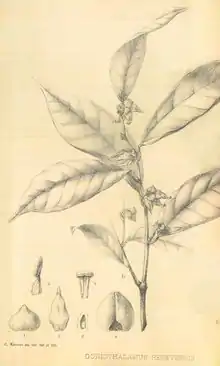| Goniothalamus repevensis | |
|---|---|
 | |
| Botanical illustration of Goniothalamus repevensis | |
| Scientific classification | |
| Kingdom: | Plantae |
| Clade: | Tracheophytes |
| Clade: | Angiosperms |
| Clade: | Magnoliids |
| Order: | Magnoliales |
| Family: | Annonaceae |
| Genus: | Goniothalamus |
| Species: | G. repevensis |
| Binomial name | |
| Goniothalamus repevensis | |
Goniothalamus repevensis is a species of plant in the family Annonaceae. It is native to Cambodia, Laos and Thailand.[1] Achille Eugène Finet and François Gagnepain, the French botanists who first formally described the species, named it after Mt. Knang-Repeuh[2] in Cambodia where Jean Baptiste Louis Pierre collected the lectotype specimen they examined.[3]
Description
It is a bush or small tree reaching 6-7 meters in height. Its black, slender branches have fine dark-red hairs when young, but later become hairless. Its oblong leaves are 3.5 by 13 centimeters with tips that come to a long tapering point and bases that taper to their connection to their petioles. Both surfaces of the leaves are hairless and their margins are wavy. Its leaves have thin secondary veins that arch and connect with one another near the leaf margins. Its hairless, wrinkled petioles are 6 millimeters long. Its solitary (rarely in pairs) are axillary and have a distinctive pink to dark-red color. The flowers are born on pedicels that are 3-5 millimeters long. Its flowers have 3 sepals that are 2.5 to 3.5 millimeters long. Its 6 petals are arranged in two rows of 3. The exterior petals are lance-shaped. The upper parts of the interior petals are fused along their margins forming a semi-spherical arch. It has numerous stamen with anthers that dehisce longitudinally and connective tissue extends above the anther lobes to form a thick flat top. Its ovaries are covered in coarse hairs. Its styles are attached to the side of the stigma forming a ventral suture. Its large, convex, elliptical stigmas with prominent papillae are characteristic for the species. Its fruit are 1 - 2.6 centimeters long.[3][4]
Reproductive biology
The pollen of G. repevensis is shed as permanent tetrads.[4]
Habitat and distribution
It has been observed growing in dry evergreen forests at elevations of 600-900 meters. [4]
Uses
In Cambodia it is commonly called Vor Krovan and is reported to be used in cosmetics.[5][6]
References
- ↑ "Goniothalamus repevensis Pierre ex Finet & Gagnep". Plants of the World Online. The Trustees of the Royal Botanic Gardens, Kew. n.d. Retrieved January 26, 2019.
- ↑ Turner, I.M. (2018). "Annonaceae of the Asia-Pacific region: names, types and distributions". Gardens' Bulletin Singapore. 70 (2): 409–744. doi:10.26492/gbs70(2).2018-11. ISSN 0374-7859.
- 1 2 Finet, A.; Gagnepain, F. (1906). "Contribution à L'étude de la Flore de L'Asie Orientale". Bulletin de la Société Botanique de France (in French and Latin). 4: 55–170.
- 1 2 3 Saunders, Richard M. K.; Chalermglin, Piya (2008). "A synopsis of Goniothalamus species (Annonaceae) in Thailand, with descriptions of three new species". Botanical Journal of the Linnean Society. 156 (3): 355–384. doi:10.1111/j.1095-8339.2007.00762.x. ISSN 0024-4074.
- ↑ Motzke, Iris; Wanger, Thomas C.; Zanre, Erin; Tscharntke, Teja; Barkmann, Jan (2012). "Socio-Economic Context of Forest Biodiversity Use Along a Town-Forest Gradient in Cambodia" (PDF). The Raffles Bulletin of Zoology. Supplement No. 25: 37–53.
- ↑ Turreira Garcia, Nerea; Argyriou, Dimitrios; Chhang, Phourin; Srisanga, Prachaya; Theilade, Ida (2017). "Ethnobotanical knowledge of the Kuy and Khmer people in Prey Lang, Cambodia" (PDF). Cambodian Journal of Natural History (in Khmer and English). 2017 (1): 76–101.